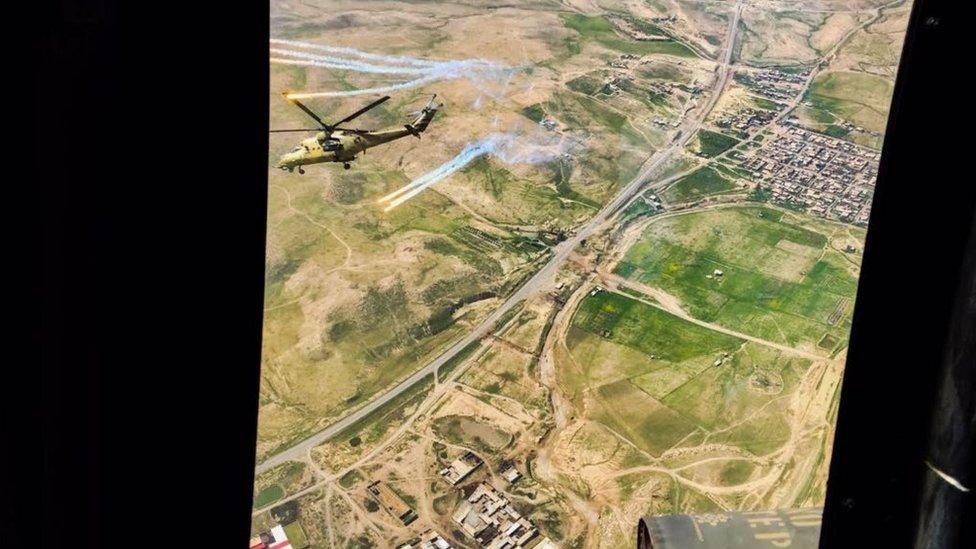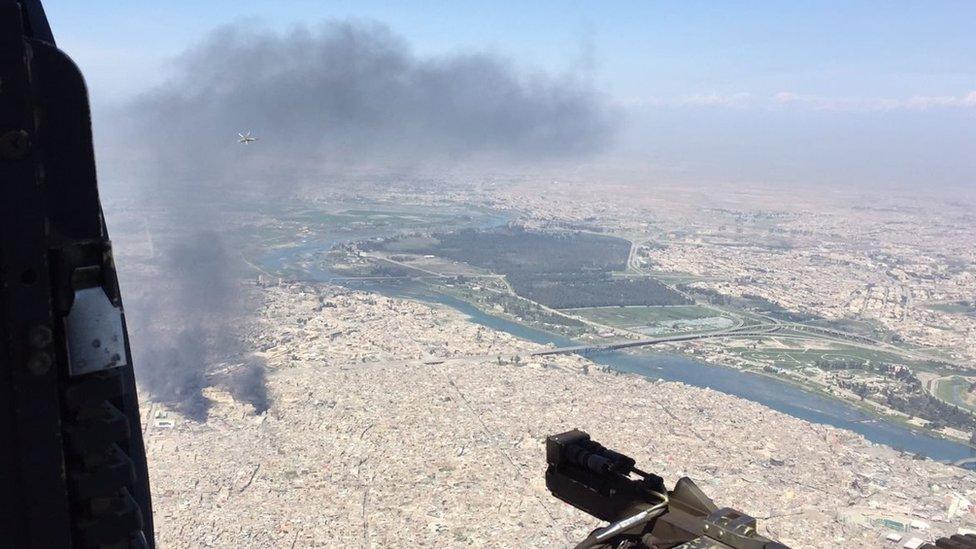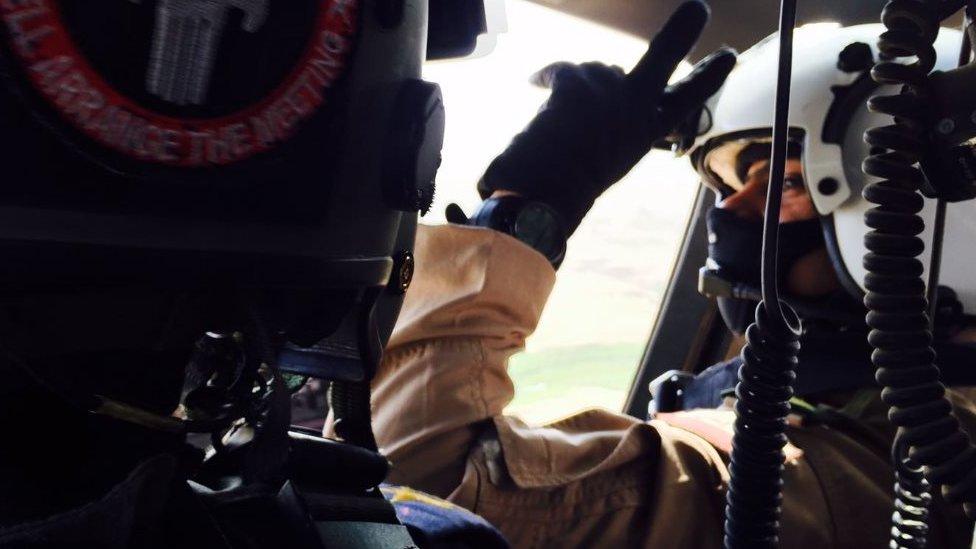Mosul from the sky: Evidence of IS using human shields
- Published
IS militants were seen using human shields
The BBC has seen evidence that so-called Islamic State (IS) has been using children as human shields as they fight to keep control of the Iraqi city of Mosul. BBC Persian correspondent Nafiseh Kohnavard and producer Joe Inwood had exclusive access to helicopter missions of the Iraqi military and witnessed the battle from above.
Erij Military camp is a dusty compound just a few miles south of Mosul. The mangled and melted gas tanks that rise in the background hint at violent battles in the recent past. Giant attack helicopters sit on the tarmac, their sleek fronts give them an aggressive look, ready for action.
They never have to wait long.
Within minutes of our arrival, two young men in their flight suits run to their helicopter. The ground crew spring into action and within moments they are in the air. Their destination is west Mosul, the newest front in the battle against IS.
We spent more than a week living at the base, flying with the pilots who have helped in the battle against the militants who have ruled Mosul for two years.
It is not the first time that we have followed Iraq's helicopters as they battle IS: at Sinjar as they delivered aid to refugees trapped on the mountain; over the factory in Mishraq that doubled as a training camp for suicide bombers; last summer in the bloody fight for Falluja.

Thousands of residents are still trapped in Mosul, Iraq's second-largest city
But, somehow, this time felt different. General Samir Hussain, the man in charge of the mission, confirmed our suspicions.
"Mosul is the toughest job we have ever had. There is no comparison with any other mission that you have witnessed."
It should not be surprising. For the first time, the pilots are operating above a city where tens, maybe hundreds of thousands of civilians are trapped. And, unlike Falluja, the militants are encircled. They have no prospect of escape or chance of a military victory. And so they turn the people of Mosul into human shields.
As we sit having tea one morning, we see a familiar face. With his smiling eyes and toothy grin, Colonel Mohammed is a popular figure amongst the Iraqi army. He is also one of their most experienced pilots. We last saw him flying over Falluja.
He joins us for a green tea, and describes a scene he recently witnessed in old Mosul. The smile flickers from his face as he recalls it. An IS sniper had shot a woman in the street. She was being used as bait to lure federal police into his cross hairs. Col Mohammed was called in for air support.

IS militants have been encircled in Mosul as the Iraqi army moves in to recapture the city
It is just one example of the suffering being inflicted on the people of Mosul by IS. But their pain has not only come from the ground. Civilian deaths at the hands of coalition air strikes have been a source of both controversy and embarrassment for the Iraqi government.
Col Mohammed acknowledges that a potential danger is there. It was enough to make his wife and children beg him not to come. To this day they do not know he is here. "They think I am training," he jokes.
So, when firing high-explosive missiles into the middle of a city, how can he be certain he will not hurt an innocent civilian? The answer may be the only one he can give: he puts his faith in God.
But it is not just faith guiding him. We witnessed pilots holding fire as often as not. The on-board camera picked up clear examples of IS fighters walking in the streets in the company of children. If the shot was not clear, it was not taken.

The Iraqi military has pushed the militants from several neighbourhoods of Mosul
As we land from another flight, the sound of gunfire still ringing in our ears, there is an unfamiliar helicopter on the tarmac. It is bigger than the others and unarmed. A group of people runs towards it carrying a stretcher. In the distance flashing lights pull into view. One casualty becomes three, amongst them a general.
It is a reminder that no matter how well the battle seems to be going, war is never without cost.
When the Iraqi army fled Mosul two years ago, leaving it in the hands of IS, it was a source of national humiliation. Retaking it, therefore, is about more than territory and security, it is about restoring reputation and pride.
But it is also about showing the people of Mosul that the government in Baghdad is on their side. Every wayward missile, every stray bullet, every wounded or dead civilian undermines that work, handing a propaganda victory to IS even as they suffer military defeat.